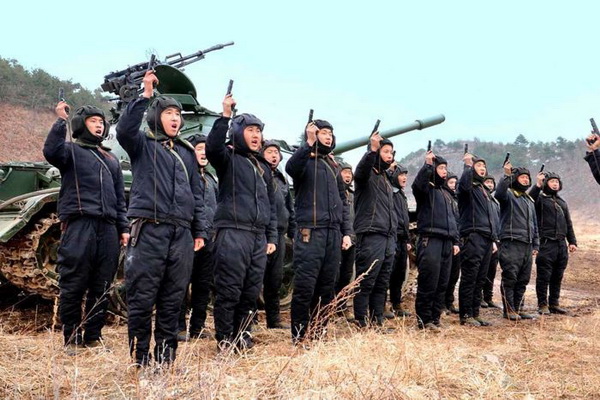


Photo: North Korean soldiers point their guns to the sky during military drills at an undisclosed location in March, 2013. (Korean Central News Agency)
Source: Korean Central News Agency
By Sun Xingjie (孙兴杰)
Apr 8, 2013
Economic Observer Online
Translated by Laura Lin
Original article: [Chinese]
On Apr 6, China's new Foreign Minister Wang Yi (王毅) discussed the North Korean situation on the phone with UN Secretary-General Ban Ki-Moon.
Wang made China's stance quite clear: it will not allow "troublemaking" at its doorsteps. This is the toughest talk to date from the Chinese government, and its intention is clear: to defuse North Korea's provocations.
Over the past month, North Korea has continuously ramped up its bellicose rhetoric to test the international community's bottom line.
First it cancelled both its 60-year-old armistice agreement as well as its hotline and nonaggression pact with South Korea. Then it announced it was in a "state of war" with South Korea and warned that any provocation by Seoul and Washington would trigger a nuclear-war. It then positioned its forces to attack U.S. military bases in the Pacific – Guam and Hawaii – and restarted its Yongbyon nuclear facility.
North Korea has become the focus of global media attention. Even the Cuban revolutionary leader Fidel Castro wrote a column urging North Korea to use restraint and to refrain from embarking on nuclear war. Obviously the threat of a Korean war has reached the bottom line of world peace.
As North Korea's close neighbor, it is not possible for China to stay out of this. And as a global power it's obligated to mollify this escalating bellicose rhetoric.
Wang's position is the consistent stance of the Chinese government, which is solving the problem through negotiation, promoting the denuclearization of the Korean Peninsula and maintaining its peace and stability. But at the same time, Wang's statement that Beijing "opposes any provocative words and actions from any party in the region and does not allow troublemaking at the China's doorstep" (反对任何一方在这一地区的挑衅言行,不允许在中国的家门口生事) is quite interesting.
Who is "provoking" the crisis on the Korean Peninsula? The recent escalation started after North Korea launched a rocket and carried out a third nuclear test. As a consequence, the UN Security Council voted in favor of sanctions against North Korea, who responded by adopting an even tougher stance and threatening the U.S.-South Korean military alliance with preemptive nuclear strikes.
Objectively, North Korea's crude nuclear devices and rockets do not constitute a threat to the U.S., though it does pose a certain threat to South Korea and Japan. However, war is not a trifling matter. The fact that the U.S. has deployed its most advanced fighter jets and warships to the region has further escalated the conflict.
The boundary between the one provoking the crisis and the one who is being provoked is blurred.
China is worried that a mistake in this war of intimidation could lead to a real war.
Focus on War Not Peace
China, by saying it is opposed to "troublemaking at its doorsteps" (在中国的家门口生事) is stating explicitly that it will not accept a second Korean War.
The Korean War was the product of the Cold War. The most important issue for China today is to cross the "middle-income trap" and realize its goal of a Chinese Dream.
Chinese President Xi Jinping said in the opening speech at the Bo'ao Forum for Asia, this week that no one should be allowed to throw a region, and even the whole world, into chaos for selfish gains.
North Korea has been pursuing its "Songun Military First" policy for nearly 20 years. This policy prioritizes the army and military spending over the rest. Meanwhile, its economy is stagnating and its people are experiencing none of the development and improvements in quality of life that the rest of Asia and the world have been experiencing.
Though Kim Jong-un says he plans to develop his country's nuclear force parallel to economic construction, by restarting the mothballed Yongbyon nuclear facility while closing down the Kaesong industrial park, it's evident that North Korea is putting the focus on war rather than on peace.
For a regime with a closed economy that neglects its population, economic sanctions are not going to be effective. It will be like asking a skinny person to stay thin – it won't be difficult for them.
The way forward for the Korean Peninsula lies in multilateral negotiations, as advocated by Foreign Minister Wang when he called for the "restoration of six-party talks and to bring the issue back to the track of dialogue."
The fact that North Korea unilaterally ended the Korean Armistice Agreement and reactivated its nuclear facilities not only disregards the fact that China is one of the signatories of the armistice agreement, it also kicks out the legs from below the six-party talks table.
Kim Jong-un's personal message to Dennis Rodman that he would like President Obama to give him a call was his attempt at establishing a bilateral U.S.-North Korea relationship to show that North Korea is on "equal footing" with the world's most powerful country.
By insisting on six-party talks Wang quickly extinguished Kim's dream of dealing with the U.S. alone.
News in English via World Crunch (link)


